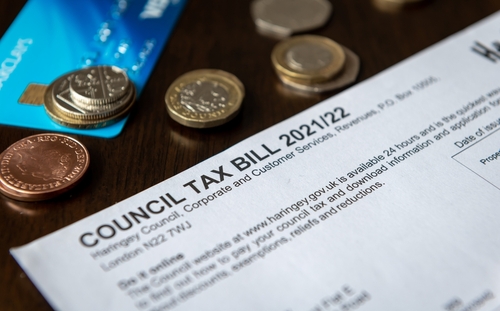Wage Arrestment Expert
By the time payday rolls around, we know that many people dread checking their bank account. As times get tough and money runs short, it’s no wonder that people slip into all kinds of unfortunate debt.
What’s more, thinking about the process of paying to get that debt cleared is just another source of anxiety. The words ‘wage arrestment’ are far from pleasant – immediately, you’re caught in a whirlwind thinking about whether your wages are going to be lower than expected because some has already been taken off to pay off existing debt.
Have you been through this? Well, worry not – we can help!
Wage Arrestment Expert is a division of Council Tax Helpline CIC, a not-for-profit organisation that offers free advice and help to anyone facing a wage arrestment. Even if you’re unsure of the help you may need or the specific advice you’re looking for, there’s something for you in our services.
Read on to find out how Wage Arrestment Expert can help you.
Why Choose Wage Arrestment Expert for Council Tax Debt Advice in Scotland

Friendly, non-judgemental
Sometimes, all you need is a friendly face and someone you can rely on to help guide you through your financial situation. Here at Wage Arrestment Expert, we will always put your needs first and help you solve your debt crisis without judgement.
We have all been in situations that we might not want to share with other people. This is why our team operates a non-judgmental service.

Specialist council tax advice
Although we offer advice for a range of debt problems, our main focus is council tax debt and wage arrestment. Due to our specialist knowledge in both of these areas, we are confident that we are one of the best council tax specialists in Scotland.
Our hard-working team has helped a range of people get through their council tax payment problems, and we’ll use this experience to ensure you get the best results. We may even be able to spot something that other advice services may have missed!

Proven track record
An advice service that has a proven track record will generally offer a far more reliable service than one that doesn’t. We pride ourselves on our proven track record and have helped thousands of people across Scotland with a range of debt problems.
We constantly achieve great results as each of our specialists will dedicate themselves to finding a solution that is best suited to your needs. By taking your circumstances into account, we can negotiate a deal that will offer you a manageable way to handle your council tax debt.

Continued support
Here at Wage Arrestment Expert, we don’t believe in single answers. This means we’ll keep working alongside you to find a solution that is ideal for you and make sure that you are confident in handling any earnings arrestment or debt repayments you may be facing.
After our highly qualified advice team has provided you with an initial consultation, our support won’t just end there. Our goal is to consistently work alongside you to give you the platform you need to get out of any tricky financial situation.
What is the Council Tax arrears collection process in Scotland?
Reminder Notices
One of the first steps of any debt collection process is to send a reminder regarding the amount of debt that is owed. If you miss a council tax payment, then you will usually receive a reminder within two weeks asking you to pay council tax.
Typically, once you have received a reminder notice, you will be expected to pay any outstanding council tax charges within 7 days. If the council still doesn’t receive a payment, then you will be sent a second reminder notice.
After 7 more days, if payment still hasn’t been sent, then you may be asked to pay a single large sum. This will typically cover your council tax and your water and sewage bills for the entire year.

Summary Warrant
The next step – if payment still hasn’t been received – is a summary warrant. This is extremely similar to a court summons in that it will allow further action to be taken to seek payment. The main difference is that a summary warrant does not need to involve a court hearing.
A typical summary warrant will declare how much payment is owed alongside any relevant details regarding who the money is owed to. It is fairly common for a summary warrant to state a sheriff officers details, as opposed to your creditors.
Your warrant may also include a 10% payment charge to cover any judicial charges relating to your debt. Most summary warrants will be followed up by a charge of payment.

Charge for Payment
Once you have received a summary warrant, the sheriff officer will follow up with a charge for payment. A charge for payment in Scotland is a 14-day notice for you to pay your debt in full, including the 10% payment charge noted in the summary warrant.
If payment still hasn’t been sent within 14 days, then the local authority will seek the aid of a sheriff officer.

Sheriff Officers
If you do not settle the charge for payment in full, then a sheriff officer will proceed with other debt recovery methods. This can include an officer seizing non-essential goods from your home to cover the money that you owe.
One of the most common methods employed by a sheriff officer is an earnings arrestment. Your employer will be contacted regarding this, and you may lose a percentage of your wage each month, depending on your total income.

What Is A Wage Arrestment?
A wage arrestment, or an Earnings Arrestment Order (EAO), is where your employer may take money from your wages to pay off any debt you may owe. This process can continue until your outstanding debt is paid off, which can be an extremely frustrating and worrying process.
Your creditor cannot instruct your employer to take from your wages unless they have taken previous actions against you and have permission to do so. However, once instructed to do so by the sheriff court, your employer can deduct from your wages to pay towards your debt.
Although you can have multiple wage arrestment orders at any one time, the payment amount is limited based on how much you owe. So if you have three active EAOs, you may only be paying the same amount as if you had a single EAO.
APPLY FOR HELP
When Can A Wage Arrestment Be Used?
The most common time for a wage arrestment to be used is if you owe a single large debt to a single creditor. If you owe money to more than one creditor, then multiple earnings arrestment orders may be employed to pay back any debt that you owe.
Before a creditor can enact an earnings arrestment order, they must issue you with a debt advice and information pack. They must also ensure that a specific process has been followed. If they don’t follow the process step-by-step, then you may be able to avoid any further payments by arguing against them.
APPLY FOR HELP

How Much Of My Wages Can Be Taken?
The amount of money that can be taken from your wages will depend on how much you owe, and whether they take it from daily, weekly or monthly net earnings. There is also a limit to how much can be taken depending on your overall net income.
When it comes to wage arrestment, there are certain limits to where the money can be taken from. Any money you pay towards your pension, cannot be seized by an EAO. However, bonuses, any commission you earn and even your statutory sick pay can be included in the wage arrestment order.
For further guidance on EAOs, Citizens Advice Scotland offers free advice. Additionally, our Wage Arrestment calculator article provides detailed insights into how your wages could be affected, helping you understand these limits and calculations more clearly.
APPLY FOR HELPHow Will My Employer React To My Wage Arrestment?
If your employer has been contacted regarding wage arrestment by a sheriff court, then they are legally obligated to take a percentage of money from your wage to pay off your debt. Any employers that refuse to arrest your wages may be held liable to pay the amount that should have been taken.
Typically, an employer will arrest a percentage of your wage once instructed to do so by the sheriff court as they may be held accountable for some payments if they fail to do so. They are also legally allowed to add a £1.00 administration fee for each time this process is needed.
APPLY FOR HELP
How Do I Apply For Help With A Council Tax Earnings Arrestment?
Our trained advisors are here to help with Council Tax arrears issues, so if your wages have been arrested don’t hesitate to call us on 0141 255 2104 to speak to one of our trained council tax advisors.
Alternatively, you can use our free online application form to apply for help. It’s quick and easy to use and it’ll take you through some basic questions so we can see how best to help you.
APPLY FOR HELPHow To Stop a Wage Arrestment or Earnings Arrestment

Debt Advice from Council Tax Debt Specialist
If you are currently undergoing a wage arrestment, then it is incredibly important that you seek advice from a debt advice organisation that you can trust. Ideally, you will want that organisation to specialise in Scottish Council Tax debt advice as they will be able to offer you the most relevant advice.
One of the most important aspects of debt-related advice is that it is tailored to your specific situation. This is why it is important that you find a service that is not only trustworthy but also regularly gets results.
Our team of dedicated specialists will ensure that any advice they give is pertinent to your situation. Struggling with debt can be stressful, but with a friendly team alongside you, getting through it has never been easier.

Special Payment Arrangement
If you are at an earlier stage of the council tax collections process and haven’t had notification that your wages are about to be arrested or already have been, we will, with your written permission contact both the Council and the appointed Sheriff Officers to request a special instalments scheme to repay any outstanding Council Tax you own in an affordable and sustainable way.
It is entirely at the discretion of your Local Authority as to whether they accept the proposed arrangement however, our experienced team understand what is and isn’t likely to be accepted and will work with you to ensure any offer of repayment put forward, is likely to be accepted.
It is important to note that if you default on a ‘special payment arrangement’ it is unlikely that further arrangements will be agreed and you Local Authority will, in most cases, instruct the Sheriffs to arrest your wages.

Debt Arrangement Scheme (DAS)
Another way that you may be able to avoid wage arrestment is through a Debt Arrangement Scheme or DAS for short. The DAS is a scheme set up by the Scottish Government to ensure you can pay off any outstanding debt in a manageable way.
The DAS allows you to set up a single account, known as a Debt Payment Programme (DPP). You can then pay money into your DPP, which is equally split up between any creditors that you may owe money to.
This will allow you to handle any council tax debt in a far more manageable way. As opposed to keeping track of multiple payments, a DAS allows you to only worry about a single payment account.
You can apply for a DAS regardless of the amount of debt you owe. You may also set up a shared account with a spouse, cohabiting partner or civil partner if you are both currently in debt to one or more creditors each. If you want to apply for a DAS and set up a DPP, then you will need to seek the aid of a money adviser. A money adviser will help you set up the payment plan that is best suited to your financial situation and ensure you have access to a DAS that is suitable to your needs.
Accountant in Bankruptcy (AiB) can help you set up a DAS and ensure you get the best scheme suited to your circumstances.
You can also find out more about DAS and whether or not it is the right payment option for you on our Debt Arrangement Scheme page.

Trust Deed (Scotland)
If you owe money to a creditor, then you can voluntary agree to a trust deed. A trust deed is where you agree to pay a set amount of money to your creditor for an agreed-upon period. Once the fixed period has ended, the remainder of your debt will be wiped off.
Once a trust deed has been agreed on, your personal belongings and related assets (such as properties you own) will be passed to a trustee. The trustee is then responsible for paying as much from your debt to your creditors as possible.
This can be a great way to consolidate large amounts of debt, and can truly help you out with council tax debt. By agreeing to a manageable series of payments, you may be able to wipe away a large percentage of your overall debt.
A trust deed is best suited to people who owe large sums of money, greater than £5,000 or who can manage regular payments for a fixed time. You may also want to consider a trust deed if you own a property as this can be used to pay off your debt.
To find out more about trust deeds and whether or not you should consider agreeing to a trust deed with your creditors, check out our Trust Deed page.
What Powers Do Sheriff Officers Have?
Are they the same as police officers?
No, sheriff officers do not have as much power as police officers. Unlike police officers, they can only enforce existing court orders and deliver legal papers. They cannot enforce orders without permission directly from the court.
You can find out more about what a sheriff officer can and cannot do on the SMASO website.

Can they force entry?
Whether or not an officer can forcefully enter your property will once again depend on whether or not they have permission from the court. If a sheriff officer does have permission to enter your home, then they may enter without your permission using “reasonable force”.
However, an officer can only enter your home when you are not there if it is for one of the following reasons:
- Reclaiming any owned property
- If they are in the process of an eviction
- Checking that any work has already been carried out/completed
Always check if an officer is legally allowed to enter your home before they do so. If they enter without the court’s permission, then they are breaking the law!


Can they enter your home?
A sheriff officer can enter your home or workplace as long as they have permission from the court to do so.
Before you allow an officer onto your property, always ask for identification or proof that they are who they say they are.

What property can they take?
Once permission has been given to an officer to take your belongings to pay off your debt, they are legally allowed to seize the following:
- Furniture
- Jewellery
- Non-essential electronics (Such as TVs and video game consoles)
- Non-essential vehicles
- Art and other decorative furniture
They may not take any item that is deemed as essential such as computers, most white goods and clothing. Items stored outside in sheds and other outhouses are at the highest risk as they are usually the easiest to access if they cannot get inside your property.
Who Are The Main Sherriff Officer Companies?
Scott and Co.
One of the leading debt recovery services in Scotland, Scott and Co. frequently send out sheriff officers to collecting any debt you may owe. A range of private and public companies have worked alongside Scott and Co to enforce payment of remaining debt.
Scott and Co hire the most sheriff officers in Scotland, which is why they are one of the most common collection agencies a debtor may encounter.
Walker Love
Walker Love is a firm of Messengers-at-Arms and Sheriff Officers that operate throughout Scotland, and even in some places across Europe. Unlike some other debt recovery services in Scotland, Walker Love is officers of the court. This means they can directly enforce court orders and civil warrants.
Walker Love most commonly collects unpaid council tax and benefits overpayments, but they may also business rates and other forms of private and consumer debt.
Stirling Park
With a team of over 20 officers and messengers-at-arms, Stirling Park is one of the debt recovery agencies you may encounter if you owe Scottish council tax or other forms of debt. They offer their debt collection services to both the public sector and private sector organisations within Scotland.
If you have recently been contacted by Stirling Park, or any other debt collection services in Scotland, then be sure to get in touch with us today!
Alex M Adamson
Another common debt collection agency that operates within Scotland is Alex M Adamson. With over 6 offices and a large team of sheriff officers, if you owe a debt to one of their clients, then you may be contacted by Alex M Adamson.
They are a member of the Credited Services Association, which is why they are one of the most common collection services in the public and private sectors.
If You’re Struggling With A Wage Arrestment, Then Get In Touch With Us Today
Wage arrestment will not only put a dent in your finances, but it can also put a dent in your mental health. You don’t have to go through this alone – we’re here to help you understand wage arrestment and find a solution that works for you and your bank account.
If you need help with wage arrestment, or just want a friendly face to guide you through it, then give us a call on 0141 255 2104. You can also use apply for help using the help page on our site. For more advice be sure to visit our Sheriff advice page.
APPLY FOR HELP
Frequently asked questions
-
What happens if I don’t pay a sheriff officer?
Typically, if you refuse to pay off your debt, then they will seek legal action against you. This will either be in the form of an EAO or they may even visit your home and take your personal belongings if permitted by the court.
It can be extremely stressful to deal with the sheriff court and debt collection agencies in general. This is why we are dedicated to offering you any advice you may need!
-
Can I lose my job with a wage arrestment?
Although it is fairly rare, there are instances where you may be dismissed from your workplace due to a wage arrestment order. This will depend entirely on your employer, but it can be considered a disciplinary offence.
If you are working in the financial sector, or a related field, then there is a higher risk that you will be dismissed due to an EAO.





